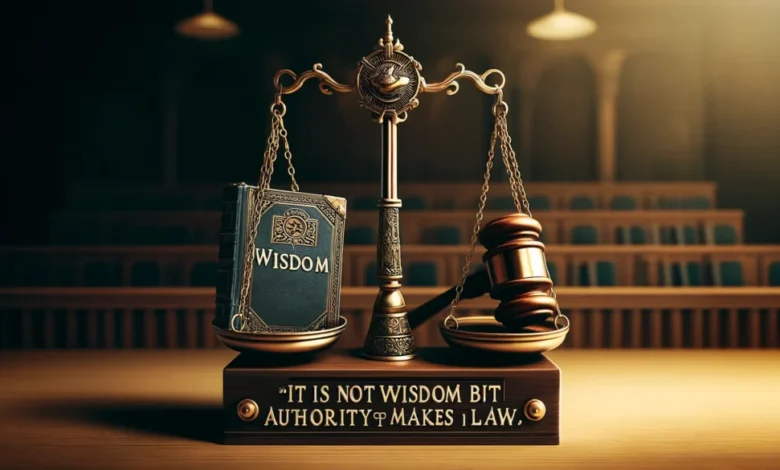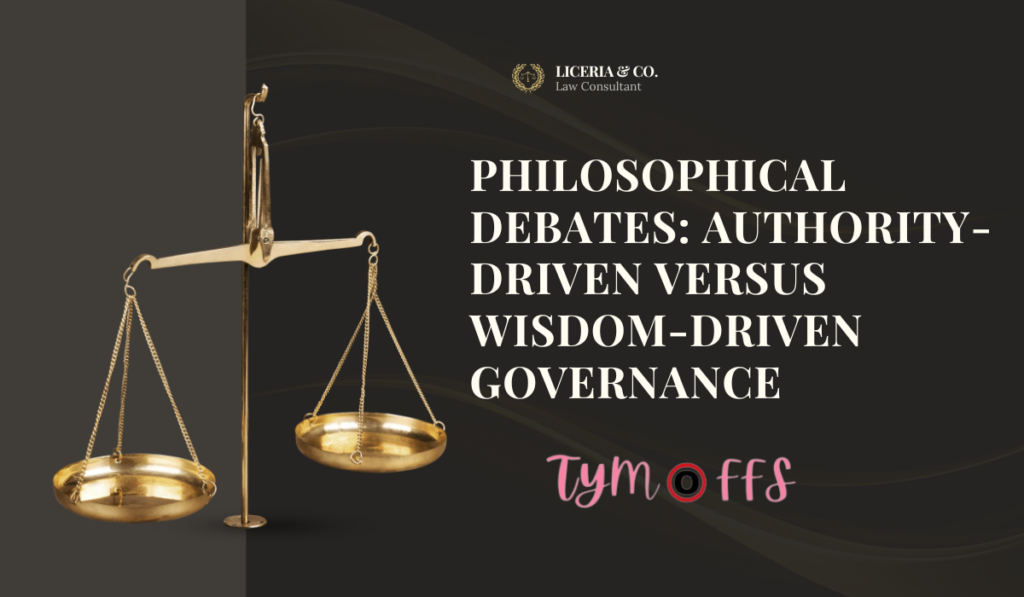it is not wisdom but authority that makes a law. t – tymoffs

Introduction
The phrase “It is not wisdom but authority that makes a law,” attributed to T. Tymoff, presents a thought-provoking stance on the fundamental forces shaping our legal systems. This article, “The Dynamics of Law: Authority’s Command versus Wisdom’s Guidance,” delves into the intricate relationship between authority and wisdom in the realm it is not wisdom but authority that makes a law. t – tymoffs of law. It explores the contrasting roles of these two elements in legislative processes, philosophical debates about governance, and their combined impact on the structure and evolution of legal systems. By examining the differing perspectives of figures like Tymoffs and Edward Gibbon, the article sheds light on the ongoing debate between the enforcement power of authority and the moral and ethical guidance of wisdom in lawmaking. This exploration is critical in understanding not just the letter of the law, but also its spirit, and how it serves justice in society.
The Dynamics of Law: Authority’s Command versus Wisdom’s Guidance
In the realm of law, the tension between the rigid command of authority and the nuanced guidance of wisdom is profound. Law often appears as a directive from those in power, establishing clear rules and boundaries. Yet, this view misses the essence of law as a repository of societal wisdom, evolving with collective experiences and ethical it is not wisdom but authority that makes a law. t – tymoffs principles. Law’s true dynamic lies in balancing these elements: authority provides structure and predictability, while wisdom allows for flexibility and adaptation to societal changes. This balance is crucial for law’s legitimacy, ensuring it serves justice in both letter and spirit.
Contrasting Wisdom and Power in Legislative Processes
Contrasting wisdom and power in legislative processes involves understanding how these two concepts influence the creation it is not wisdom but authority that makes a law. t – tymoffs, shaping, and implementation of laws.
- Wisdom in Legislative Processes: Wisdom is often associated with the quality of having experience, knowledge, and good judgment. In the context of legislative processes, it can manifest in several ways:
- Informed Decision-Making: Lawmakers who possess or seek out extensive knowledge about the issues at hand are more likely to propose and support legislation that is effective and beneficial.
- Long-Term Vision: Wise legislators think about the long-term implications of laws, not just their immediate impact. This foresight helps in crafting laws that are sustainable and beneficial over time.
- Ethical Considerations: Wisdom in legislation also involves considering the ethical implications of laws, ensuring that they promote justice and fairness.
- Power in Legislative Processes: Power, on the other hand, refers to the ability to influence or outright control the behavior of people and the course of events. In legislative contexts, power manifests in several ways:
- Majority Rule: In many legislative bodies, the majority has significant power in determining which laws are passed. This can sometimes lead to a dominance of certain viewpoints, potentially overshadowing minority opinions.
- Political Influence: Power can also come from political influence, which may be derived from political positions, party affiliations, or connections with powerful external entities (like corporations or lobby groups).
- Control over Resources: Legislators or parties with access to more resources (such as funding, media, etc.) can exert more power in the legislative process, influencing both the agenda and the outcome of legislative debates.
The interplay between wisdom and power in legislative processes is critical. Ideally, wisdom should guide the use of power in creating laws that are beneficial for the society at large. However, the reality is often more complex, with power dynamics sometimes overshadowing wise decision-making. Balancing these two elements is key to effective and fair legislation.
Philosophical Debates: Authority-Driven Versus Wisdom-Driven Governance
The debate between authority-driven and wisdom-driven governance is a fascinating and longstanding one in the realm of philosophy and political theory.

Authority-Driven Governance
Authority-driven governance is structured around the centralization of power, often in the hands of a select few individuals or groups. This model is typically underpinned by legal, traditional, or religious justifications that grant legitimacy to the ruling authority. Proponents argue that this approach ensures stability and order, particularly in times of crisis, due to a clear chain of command and unified decision-making. However, the primary criticisms of authority-driven governance center around its potential for abuse of power, lack of transparency, and suppression of individual rights and freedoms. Historical examples include monarchies and certain authoritarian regimes, where decision-making is top-down and dissent is often discouraged or penalized.
Wisdom-Driven Governance
Wisdom-driven governance, in contrast, emphasizes decision-making based on knowledge, ethical reasoning, and often, democratic principles. This approach finds its philosophical roots in ideas like Plato’s concept of philosopher-kings, who are rulers chosen for their wisdom and moral integrity. The main advantage of this model is its focus on just and informed decision-making, which aims to be adaptive and inclusive of diverse perspectives. However, challenges in this approach include defining and measuring ‘wisdom,’ avoiding potential elitism, and the practical difficulties in implementation, especially in large, complex societies. Supporters of wisdom-driven governance advocate for the importance of expertise and ethical considerations in political leadership, aiming for a more enlightened form of rule.
Balancing Authority and Wisdom in Governance
In reality, most contemporary forms of governance incorporate elements of both authority and wisdom. The balance between these two can significantly impact how a society functions and how its citizens experience governance. Philosophical discussions in this context often explore the legitimacy of power, the role of education and expertise in political decision-making, and the ethical dimensions of governance. These debates are crucial for understanding the complexities of political systems and for envisioning how societies might evolve towards more effective and equitable forms of governance. The ideal balance is a subject of ongoing debate, reflecting the diverse values and priorities of different cultures and communities.
The Role of Authority in Shaping Legal Systems
Authority is the linchpin in the architecture of legal systems, fundamental in both their creation and operation. The process begins with the establishment of laws, where legislative bodies or sovereign rulers exert their authority to formulate legal codes. This legislative power shapes the rules and norms governing a society, embodying its values and expectations. Once these laws are in place, their effectiveness hinges on the strength and fairness of enforcement. Law enforcement agencies and regulatory bodies, armed with legal authority, ensure adherence to these laws. Their role is crucial in maintaining social order and upholding the principles laid down in legal statutes.
Equally significant is the role of the judiciary, which wields the authority to interpret and apply laws to specific cases. Judges and courts, through their judicious power, resolve conflicts, clarify legal ambiguities, and set important precedents that guide future legal interpretations. Beyond mere application, the authority vested in these institutions also instills public trust and legitimacy in the legal system. Moreover, as societies evolve, so does the need for legal systems to adapt. Here, authority facilitates the amendment and modernization of laws, reflecting changing societal norms, technological progress, and global trends. In democracies, this authority also serves a protective function, safeguarding individual rights and liberties against potential overreach, thereby striking a balance between the power of the state and the freedoms of its citizens. This multifaceted role of authority ensures that legal systems remain dynamic, responsive, and aligned with the principles of justice and equity.
Authority Over Wisdom: T. Tymoff’s Stance on the Foundations of Law, Contrasted with Edward Gibbon’s Views

T. Tymoff’s Stance on Law: Authority as the Foundation
T. Tymoff’s perspective emphasizes authority as the cornerstone of legal systems. This stance suggests a belief in the primacy of established structures, hierarchical power, and a top-down approach to lawmaking and enforcement. In Tymoff’s view, the stability and effectiveness of law are primarily rooted in respect for, and the power of, authority figures and institutions. His approach is less concerned with the philosophical or ethical righteousness of laws and more focused on the power structures that enforce and sustain them. This view aligns with legal positivism, which sees law as the command of the sovereign, emphasizing the practical need for order and a governing framework.
Edward Gibbon’s Views: Wisdom and Ethics in Law
Contrasting with Tymoff, Edward Gibbon, known for his extensive work on the history of the Roman Empire, might argue that wisdom is critical for the foundation and maintenance of effective law. His historical analysis suggests that enlightened governance, moral principles, and a deep understanding of human nature are essential in lawmaking. Gibbon’s view points towards a law that evolves based on rational thought, ethical considerations, and lessons learned from history, rather than solely on the directives of those in power. This perspective resonates with natural law theory, which posits that law should align with moral principles inherent in human nature, emphasizing the importance of ethical considerations in law.
Integrating Authority and Wisdom in Law
The contrast between Tymoff’s emphasis on authority and Gibbon’s focus on wisdom reflects a fundamental debate in the philosophy of law: the legitimacy and foundation of legal systems. While Tymoff’s approach underlines the necessity of authoritative structures for societal order, Gibbon’s viewpoint highlights the critical role of moral and ethical principles in shaping just laws. Most contemporary legal systems strive to integrate both aspects, acknowledging the need for authoritative governance while also aiming to align laws with universal principles of justice and ethics. This balanced approach seeks to ensure that laws are not only enforceable but also resonate with broader human values and ethical standards.
The importance of balancing authority and wisdom in creating just laws
Creating just laws requires a careful blend of authority and wisdom. Authority ensures that laws are enforced and respected, giving the legal system its backbone. It’s the power behind the rules, the force that keeps society in order. Without authority, even the most thoughtfully crafted laws could be ignored, leading to disorder and injustice.
Authority alone isn’t enough. Wisdom is the guiding light in lawmaking, ensuring that laws are not only enforceable but also fair and ethical. Wisdom takes into account the diverse needs of a society, learns from past experiences, and anticipates future challenges. It’s about crafting laws that are not just rules to follow, but principles that foster a just and equitable society.
The dance between authority and wisdom in lawmaking is crucial. Authority without wisdom can lead to tyranny, while wisdom without authority can lead to ineffective governance. Together, they ensure laws are both respected and respectable, forming a system that is strong yet sensitive to the changing tides of societal values and ethical norms.
Final Words
The exploration of the dynamics between authority and wisdom in lawmaking, as discussed in this article, reveals the complexity and depth of what constitutes effective and just legislation. T. Tymoff’s emphasis on authority highlights the crucial role of power structures and enforcement in maintaining social order, while contrasting perspectives like that of Edward Gibbon remind us of the indispensable value of wisdom, ethics, and moral reasoning in the creation and evolution of laws. In the end, the balance between these two elements appears to be the cornerstone of a legal system that is both robust and fair. Authority provides the structure and enforceability, ensuring laws are respected and followed. Wisdom, on the other hand, ensures these laws are rooted in ethical principles and adaptability, resonating with the evolving values of society. The synthesis of authority’s command and wisdom’s guidance is not just desirable but essential in forging legal systems that uphold justice, equality, and the greater good of society. This nuanced understanding of the dynamics of law serves as a guiding principle for legislators, jurists, and citizens alike, as we strive towards a more just and enlightened governance.
it is not wisdom but authority that makes a law. t – tymoffs



